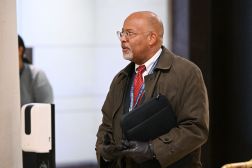- Sponsored
- Workforce
Remote workers could reduce federal IT skills deficit

A shortage of IT skills, especially those that would allow agencies to operate and secure today’s cloud-enabled IT environments, are continuing to handicap agencies as government competes for younger talent, according to new research produced by FedScoop and WorkScoop.
Among the findings: 8 in 10 federal CIOs, budget and human capital officials surveyed said they are moderately or highly concerned about being able to replenish their IT staffs with a younger generation of talent who are trained on more modern tools.

Read the full report.
Additionally, 1 in 3 respondents reported more than 10 percent of their full-time IT jobs are currently vacant; and 6 in 10 have at least some full-time positions open. Roughly 2 in 3 said IT vacancy rates are higher, or the same, compared to a year ago.
Roughly half of respondents cited the government’s complicated hiring process and the lack of focus around IT workforce planning as key constraints to improving the federal IT workforce.
The study surveyed 126 prequalified federal decision makers in IT, human resources and budget offices. It explores how the federal government can foster more effective IT workforce planning and development to meet mission goals.
The report, which was underwritten in part by Pluralsight, also highlighted the importance for agency executives to devote more attention to developing and sharing IT workforce development plans. Only half of agency leaders surveyed said their agency had an IT workforce development plant that aligned with their agency’s broader strategic goals.
Respondents identified multiple opportunities to improve IT workforce development, including:
- Support changes to the General Schedule to better align IT salaries with market norms.
- Provide funding to upskill and reskill.
- Revise IT descriptions to align with private sector jobs, based on capabilities versus qualifications.
The survey, conducted online in August amid the pandemic, found that widespread moves to allow federal employees to work remotely may lend longer-term support to looking farther afield for IT talent. Nearly half of respondents indicated that the pandemic presented officials with greater latitude at their agencies to hire remote IT workers to fill some of their skills needs.
“Agencies can improve the hiring and retaining of the workforce by creating more opportunities to work outside of DC — permanent telework, flexible remote work or with satellite offices in other locations,” according to one respondent in the report.
The report concludes that agency leaders should consider focusing more attention on five areas to help ease systemic constraints on hiring and developing needed IT skills in government, including:
- Prioritizing workforce development plans that align with agency strategies.
- Renewing pressure on OPM, Congress and the administration to address constraints in the GS schedule.
- Aligning job descriptions with today’s technology world and streamline the hiring process.
- Putting experience ahead of college degrees to provide wider recruitment opportunities.
- Providing more time and resources to upskill and reskill current employees.
Addressing these workforce challenges could significantly improve agencies ability to hire, retain or reskill to fill the IT skills they need now, and over the next two years. Those skills, identified in a prior study by FedScoop and WorkScoop, released earlier this year, included expertise in cloud-based computing, artificial intelligence, data analysis, enterprise engineering and DevOps.
Download the report, “Federal IT Workforce Planning: Opportunities and Obstacles” for detailed findings and guidance on IT workforce needs in the federal government.
This article was produced by FedScoop and WorkScoop, and underwritten in part by Pluralsight.




